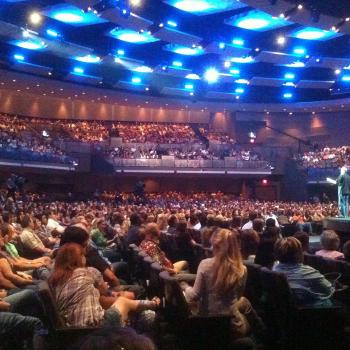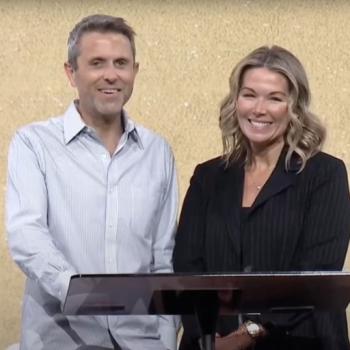Some of the intersections of faith and politics are so littered with landmines that it’s virtually impossible to navigate them without taking some shrapnel in the legs. People of faith and good will must discuss them, however, if they’re matters worth discussing, lest we leave the conversation to those who simply enjoy or actually profit from setting off explosions. So please bear with me. I’m about to draw a parallel that could easily be twisted. The parallel is not between Harold Camping and a terrorist Imam. I have no respect for that kind of moral equivalency. The parallel, rather, is between the way I feel toward Harold Camping and, in some limited respects, the way that some moderate Muslims seem to feel toward the preachers of Jihad.
So, to begin. I’ve often wondered why, when we hear of another Jihadist terrorist doing another terrible thing, moderate Muslims are not stumbling over themselves to condemn him. When an extremist Imam preaches for the downfall of America, the Great Satan, or teaching something that is completely and patently and destructively false — shouldn’t moderate Muslim leaders be angry at the harm the Imam has done to the reputation of their religion, and shouldn’t they be eager to condemn him, correct the record, and even seek to remove this Imam from power?
Some moderate Muslim leaders do speak up, of course. And some presumably cannot penetrate the media din. Still, even taking those things into account, I have often been surprised that we do not see and hear the majority of Muslims rising up en masse to carve this cancer out of the body of their faith and to bury it forever beneath a flood of righteous condemnation. If peaceful Muslims are angered when non-Muslims regard them with distrust, shouldn’t they direct their anger first at the Muslims who have attacked the innocent in the name of Islam and planted the seeds of distrust in the first place? Some moderate Muslims — including personal friends of mine — are openly frustrated when it’s suggested they should offer some comment or criticism.
Harold Camping and his ongoing doomsday debacle have helped me to understand the dynamic a little better. There’s no equivalence between the wanton destruction of innocent human life and the proclamation of a false prophecy about the end of the world. It would require moral obtuseness of the highest order, and abandonment of our powers of moral discernment, to equate a proclamation that the world is ending and all should take refuge in Christ with the attempt to explode school buses full of children. So, as I said, I’m not at all equating Harold Camping with terrorists or with Imams who exhort their followers to become terrorists.
What are illuminating, I think, are the tensions in both cases between the periphery and the center. (Of course, the more extreme critics of militant Islam will argue that the ultra-violent ideology that motivates the likes of al-Qaeda is not actually on the periphery of the Muslim world, but is more common and widespread than we care to admit. While there are pockets around the world where those who sympathize with Jihadist terrorists outnumber those who do not, I don’t believe that’s true as a general characterization of ‘the Muslim world,’ and thankfully the Arab Spring is showing another way to struggle for reform.)
So, all qualifications aside, how is this comparison illuminating?
(1) What does he have to do with me? When I’m pressed by atheists and skeptics to respond to Harold Camping and his extreme ideas — not just the 1994 prediction and the May 21st prediction, but the numerology and the esoteric calculations, the notion of a “spiritual judgment” to justify the doomsday dud, and his teaching as far back as 1988 that Satan had taken possession of American churches — some part of me resents the association in the first place. Why am I accountable for what Harold Camping says and does? Why is the presumption that I am like him, unless I publicly demonstrate otherwise? Why should I have to answer for him? Are we even of the same tribe?
One part of this is justified. There is no good faith from the skeptic who demands that I condemn him. The skeptic ought to be able to see the significant differences between myself and Harold Camping; they are obvious in the things we believe and in the ways we act. But the skeptic pays no heed to those differences because he does not really care whether or not I condemn Harold Camping; he just wants to paint me with the same brush as another Christian crackpot with crazy, irrational, unscientific ideas. It irritates me that people cannot see — or the skeptics are not willing to see — that Harold Camping is not a representative of healthy, orthodox Christianity. I imagine many Muslims feel this way: why should I be compelled to distinguish myself from the extremist, when the extremist does not represent my faith in the first place?

But another part of this is pride. I don’t want to be associated with a Harold Camping, or a Terry Jones (the Koran burner), or etc. However, as deceived as I believe Harold Camping is, insofar as he trusts in Jesus Christ (and I give the benefit of the doubt here), we are not only of the same tribe, we are of the same family. As much as I resent the association, as much as I’m embarrassed by their actions and the ways in which they harm the credibility of the Church, the fact is that I am associated with them.
There are all sorts of crazy people in the Church; some of them have megaphones. I am not called to ignore them and pretend they have nothing to do with me. I am called to reach out to them, to listen, to rebuke and correct and restore, even as I explain to the world that they have misused the Word.
2. I understand where he’s coming from. The truth is, even though we differ on some very important beliefs, Harold Camping and I have many things in common. We read the same Bible and pray to the same God. Some of our core beliefs and values are the same. I believe that the God revealed in Jesus Christ is the creator and author of all history. I believe that history will consummate in judgment and restoration.
I was raised in a non-denominational evangelical church where some of the adults believed things I found embarrassing. In various ministry settings, in the prisons and inner cities of the United States as well as on mission fields overseas, I’ve encountered countless Christians whose beliefs I found strange or implausible. I’ve had some of the most intelligent Christians I know (objectively, dazzlingly intelligent, with doctorates and many accolades to their names) tell me that they believed Christ would return in the next few years — or that demons were active in their homes before they prayed them out — or that the world is merely thousands of years old — or that my broken neck would be healed if I believed it fervently enough. And you know what? They’re good people. I love those people. In most cases, I respect them too. When you burrow deeper and deeper into a particular way of interpreting the world, you can find yourself coming to conclusions that seem very strange to people with different worldviews.
I’ve also spent plenty of time in places where my beliefs were regarded with suspicion and astonishment. At Stanford, Oxford, Princeton, and Harvard, students and colleagues and faculty typically treated me with respect; I was good at what I did, good at what we did. They knew I was no fundamentalist. But they could not believe that an intelligent and educated person should be an evangelical, much less a conservative one.
So I feel a generous measure of sympathy for Harold Camping. I know where he’s coming from. I know how he came to believe the things he did, even though I find them (the beliefs and the methods through which they were reached) wrong. And I imagine many moderate Muslims feel the same way. Even though they deplore the violence of their fellow Muslims, they understand their sense of frustration, of disenfranchisement, of anger. They’ve heard the criticisms of the west, of colonialism, of American support for despots, and they know those criticisms make a certain kind of sense to people who live inside of that worldview.
3. It’s not always easy to cut out the cancer. As I’ve watched the Harold Camping travesty unfold, I’ve often felt, “Can’t someone put a stop to this? Can’t someone intervene and show him the error of his ways?” The answer that’s come back to me is: “Why don’t you do it? If you’re going to call for other Christians to reach out to Camping and try to put a stop to the damage he’s doing to the church, shouldn’t you be willing to do so yourself?”
And yes, I should. In the same way that moderate Muslims should do what they can to correct the Imams who encourage young men to go detonate themselves in crowded marketplaces, I should do what I can to correct a Christian teacher who is misleading his followers in destructive ways. But it’s not an easy thing to do.
There are a number of reasons. (1) Do I really want to get involved? Reaching out to Camping as a fellow believer implies that he is, indeed, a Christian leader of sorts who deserves the time and attention it would take. It only makes the association between him and me even stronger in the minds of the skeptics and the mockers. (2) Is there any hope of changing his mind? A man like Harold Camping believes wholeheartedly that he’s doing the right thing, and that critical voices are (perhaps literally) the voice of the devil tempting him to give up the task to which God has called him. He’s not likely to be dissuaded, any more than an extremist Imam is. (3) Could his influence really be curbed? Camping has substantial resources and a radio network at his disposal, as well as bitter-end supporters. We live in completely distinct circles. Short of physical or legal coercion, what could I really do? (4) My life is overwhelming enough already. I have a wife, a child, another child on the way, a more-than-full-time job, side jobs and side projects, ministries. Do I really have the time to reach out to someone I’ve never met and seek to dissuade him (as I did attempt to do, for instance, with Terry Jones)?
Some of the same reasons must come up when moderate Muslims are asked, “Why don’t you remove the cancer of Islamic extremism from your community?” Moderate Muslim Americans are struggling to keep their heads above water, like everyone else, and may have no connections with, and no influence over, the extremist Imams. It’s much easier to insist that the extremist does not represent your faith than it is to correct the extremist or remove him from influence.
These are some of the tensions between the middle and the periphery in religious communities. Do you get angry at the extremists whose words and deeds tarnish the reputation of your faith? Or do you get angry with those who use the extremists for their own partisan purposes to smear the whole faith? Or both? Do you resent the embarrassing association with the crazies on the margins, or do you accept the association, accept that there are crazies in all communities and do something to heal and restore them? Do you confess that you understand where they’re coming from, or do you pretend there’s no overlap between their views and yours? And are you bound to involve yourself in the near-impossible task of changing their minds or undermining their influence, when you are overwhelmed already with the life God has given you?
I think Christian leaders, rather than lobbing criticisms from a distance, or in addition to that (since it’s important to correct the record on what the Christian faith teaches), should reach out to Camping and see whether he can be persuaded to end this damaging charade. And I should do the same. Camping should be encouraged to repent, to seek forgiveness, and to make amends. Even if it seems hopeless, it’s the right thing to do. And you never know what might happen. God has done much more astonishing things.















